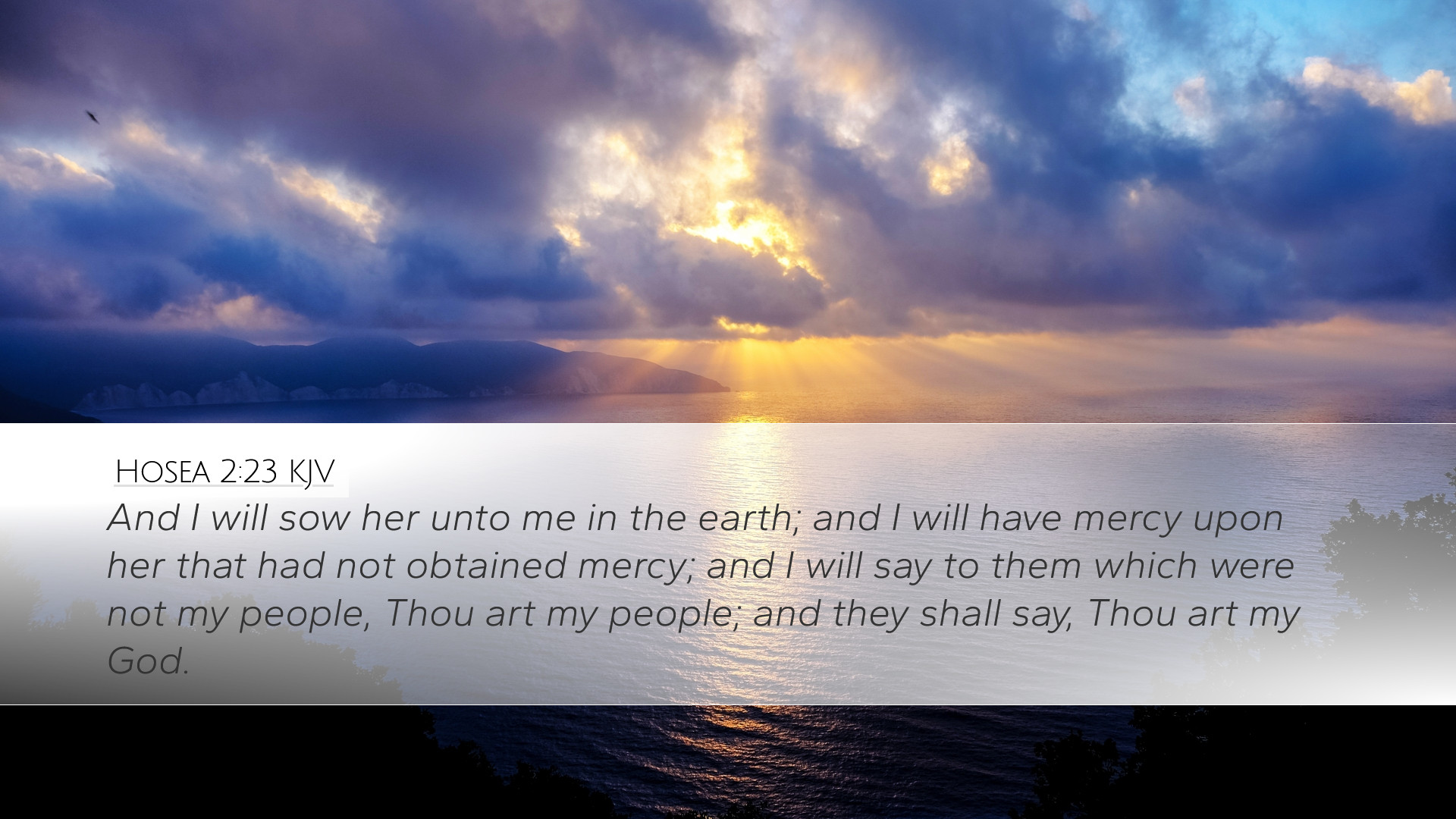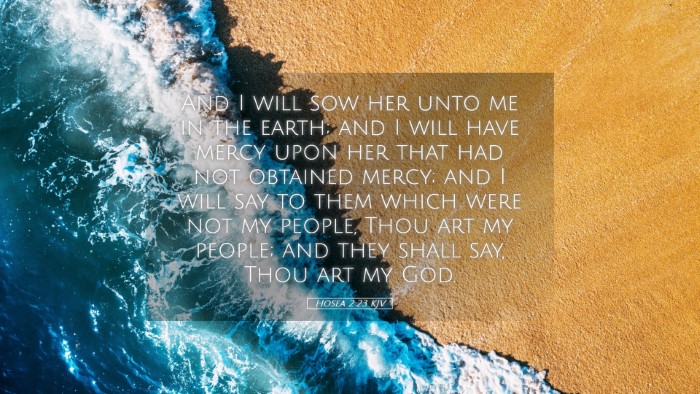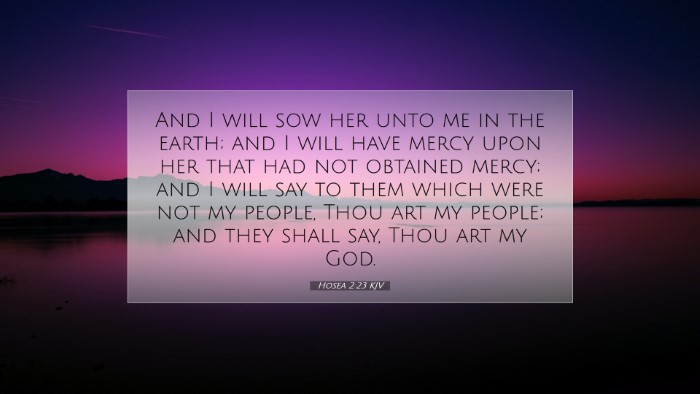Old Testament
Genesis Exodus Leviticus Numbers Deuteronomy Joshua Judges Ruth 1 Samuel 2 Samuel 1 Kings 2 Kings 1 Chronicles 2 Chronicles Ezra Nehemiah Esther Job Psalms Proverbs Ecclesiastes Song of Solomon Isaiah Jeremiah Lamentations Ezekiel Daniel Hosea Joel Amos Obadiah Jonah Micah Nahum Habakkuk Zephaniah Haggai Zechariah MalachiHosea 2:23
Hosea 2:23 KJV
And I will sow her unto me in the earth; and I will have mercy upon her that had not obtained mercy; and I will say to them which were not my people, Thou art my people; and they shall say, Thou art my God.
Hosea 2:23 Bible Commentary
Commentary on Hosea 2:23
Text of Hosea 2:23: “And I will sow her unto me in the earth; and I will have mercy upon her that had not obtained mercy; and I will say to them which were not my people, Thou art my people; and they shall say, Thou art my God.”
Introduction
The prophecy in Hosea 2:23 serves as a significant turning point in the book of Hosea, representing both judgment and restoration. This verse encapsulates God's promise of reconciliation and renewal, showcasing His relentless love for His people despite their waywardness. In this commentary, insights from public domain commentaries such as those by Matthew Henry, Albert Barnes, and Adam Clarke will be distilled to provide a comprehensive understanding of this profound verse.
Contextual Background
Hosea, being one of the Minor Prophets, delivers messages during a tumultuous period for Israel, marked by idolatry and infidelity to God. The book is characterized by its use of marriage metaphor to illustrate Israel's relationship with God. Hosea's own marriage to Gomer serves as a poignant representation of God's relationship with an unfaithful nation.
Verse Analysis
Sowing a People
I will sow her unto me in the earth;
In this phrase, the act of “sowing” signifies planting and establishing a new identity for the people. Matthew Henry notes that this sowing refers to God’s intention to reinstate His people, planting them in their land once more after exile. This is not merely about physical restoration but a deeper spiritual renewal and connection to God.
Receiving Mercy
and I will have mercy upon her that had not obtained mercy;
This part of the verse emphasizes God’s compassion. Albert Barnes explains that this signifies an extension of grace to those who have previously been condemned. The phrase “not obtained mercy” refers to the dire state of Israel, having turned away from God. Yet, God's promise to show mercy reveals His fundamental character as a loving and forgiving God, capable of redefining the past failures of His people.
Re-establishing Identity
and I will say to them which were not my people, Thou art my people;
Here, God expresses a profound transformation. Adam Clarke emphasizes that God is reclaiming those who were separated from Him. The initial estrangement due to sin is reversed, underscoring the idea that God’s identity as a covenantal keeper persists despite the failures of the people. The restoration of identity is pivotal; once estranged, they are now encompassed in God’s familial bond.
Proclamation of Divine Relationship
and they shall say, Thou art my God.
This statement reflects a response of faith and acknowledgment from the people. Matthew Henry highlights that this confession marks the culmination of their restoration – a recognition of God’s sovereignty and grace. It reflects not only the acceptance of God’s mercy but also the establishment of a renewed relationship characterized by loyalty and worship. It is a response to God’s previous act of issuing mercy, signaling a fresh start.
Theological Implications
- Grace and Restoration: The core theme of Hosea 2:23 is God’s ability to redeem and restore. The shift from judgment to mercy illustrates the transformative power of divine grace. This serves as a profound demonstration of hope for believers, showcasing the belief that no sinner is beyond the reach of God's compassion.
- Covenantal Relationship: The covenant theme prevalent in Hosea is significant. God’s commitment to Israel remains unbroken despite their unfaithfulness, highlighting God's fidelity. This emphasizes a theological framework where God’s relationship with humanity is grounded in His sovereign choice and love, rather than human merit.
- Universal Implications: Albert Barnes suggests that the implications of this restoration extend beyond Israel, hinting at the inclusion of Gentiles into God’s family. As Paul later articulates in Romans, the call of those outside the original covenant community reveals the expansive nature of God’s mercy.
Conclusion
Hosea 2:23 stands as a beacon of hope and a testament to God's unwavering love for His people. The insights drawn from respected theologians remind us that amidst rebellion and estrangement, God’s heart leans toward mercy and reconciliation. For pastors, students, theologians, and Bible scholars, this verse not only reflects God's historical actions toward Israel but also provides a template for understanding contemporary expressions of grace and redemption available to all who turn to Him. Approaching God with humility and repentance, just as Israel was called to, opens the door to the transformative covenant relationship that God promises.


